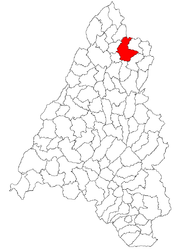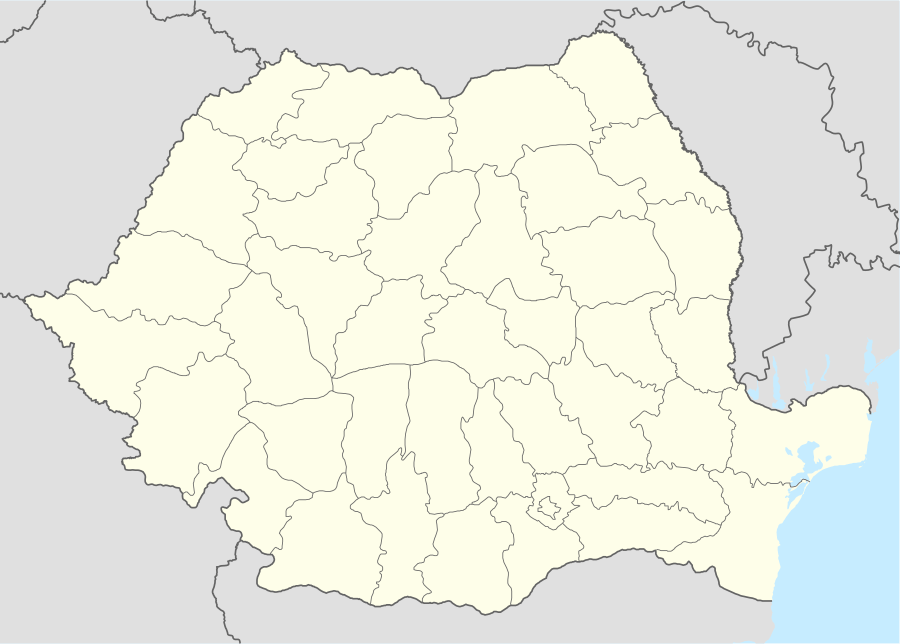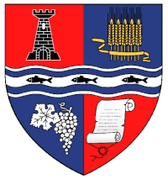Marghita
Marghita (Romanian pronunciation: [marˈɡita]; Hungarian: Margitta [ˈmɒrɡittɒ]; Yiddish: מארגארעטין Margaretin) is a city in Bihor County, Romania. It administers two villages, Cheț (Magyarkéc) and Ghenetea (Genyéte), and is 56km north-east of Oradea.
Marghita Margitta | |
|---|---|
 Coat of arms | |
 Location within Bihor County | |
 Marghita Location in Romania | |
| Coordinates: 47°21′N 22°20′E | |
| Country | |
| County | Bihor |
| Government | |
| • Mayor | Zoltán-Ladislau Pocsaly[1] (UDMR) |
| Population (2011)[2] | 15,770 |
| Time zone | EET/EEST (UTC+2/+3) |
| Vehicle reg. | BH |
| Website | http://www.marghita.ro/ |
History
The name appears to be derived from the name "Margit" (Margaret), Saint Margaret the patron of a local church. The first time it was used in a document was in 1216. In the 14th century, it became a feudal holding of the Hungarian landlord.
In 1376 king Louis I of Hungary gave to Marghita the right of organizing a fair and it developed in the next centuries as a market town. There were several peasant revolts against the feudal system affecting Marghita in 1467 and 1514. At the beginning of the 14th century, it became, together with the whole of Bihor county and Hungary, an Ottoman province.
In 1823, a great fire destroyed half of the buildings of Marghita. After the 1848 revolution, the local peasants were no longer serfs and manufacturing and industry began to develop. In 1944, after German occupation about 2,100 Jews of Marghita were sent to death, concentration and labor camps as part of the Holocaust, and about 450 from them survived. After 1947 with the Soviets imposing a Communist government in Romania, factories and land were nationalized. Over the course of the next few years, Marghita took part in the Romanian industrialization process.
Politics
The Marghita Municipal Council, elected in the 2012 local government elections, is made up of 17 councillors, with the following party composition:
| Party | Seats | Current Council | |||||||
|---|---|---|---|---|---|---|---|---|---|
| 41.18% | Democratic Alliance of Hungarians in Romania | 7 | |||||||
| 35.29% | National Liberal Party | 6 | |||||||
| 17.65% | Social Democratic Party | 3 | |||||||
| 5.88% | People's Party – Dan Diaconescu | 1 | |||||||
Population
| Year | Pop. | ±% |
|---|---|---|
| 1977 | 14,589 | — |
| 1992 | 19,071 | +30.7% |
| 2002 | 18,650 | −2.2% |
| 2011 | 15,134 | −18.9% |
| Source: Census data | ||
At the 2011 census, Marghita had a population of 15,134. According to the census, 51.7% of inhabitants are Romanians, 44.1% Hungarians, 3.5% Roma and 0.5% Slovaks.
Natives
Sister cities
References
- "Results of the 2016 local elections". Central Electoral Bureau. Retrieved 3 April 2020.
- "Populaţia stabilă pe judeţe, municipii, oraşe şi localităti componenete la RPL_2011" (in Romanian). National Institute of Statistics. Retrieved 4 February 2014.
- "Testvértelepülések". Retrieved 30 April 2014.
